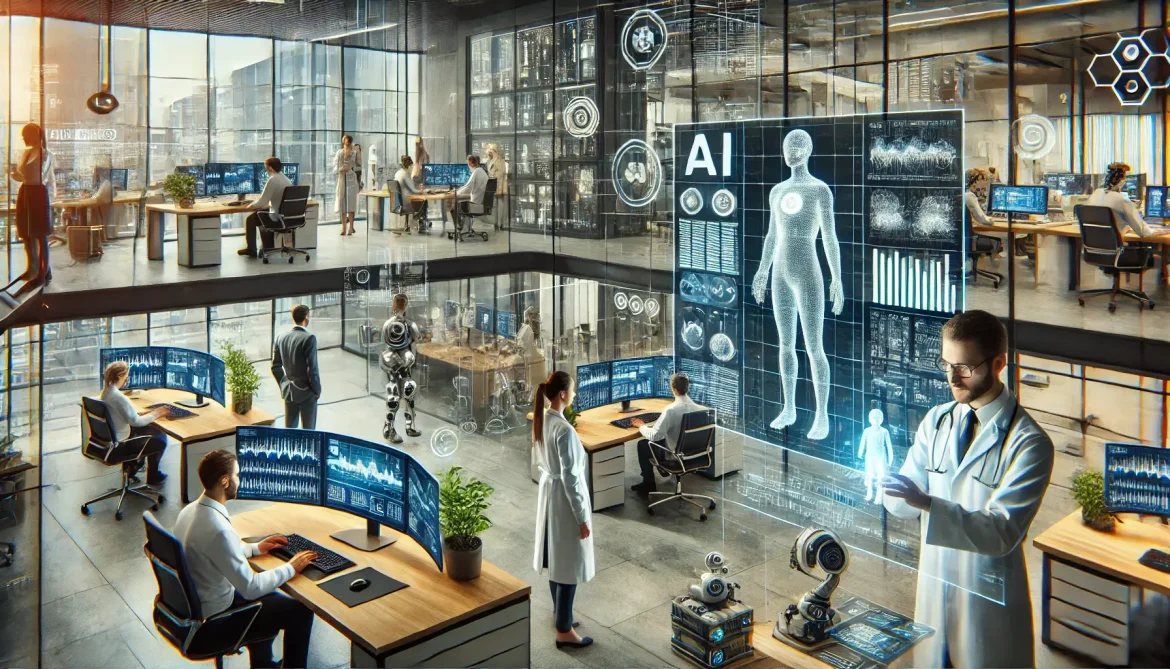Introduction
The advent of Artificial Intelligence (AI) has initiated a paradigm shift in the global job market. As AI technologies evolve at an unprecedented rate, they bring forth significant economic and social changes, affecting industries and job roles across the board. This article delves into the transformative impact of AI, examining both the opportunities it presents and the risks it poses, with a focus on preparing professionals for the future.
AI’s Transformation of Industries
Healthcare
In healthcare, AI is revolutionizing diagnostic processes and patient care. For instance, AI-powered diagnostic tools can analyze medical imaging faster and more accurately than ever before, potentially reducing diagnostic errors and improving patient outcomes. However, this raises concerns about the job security of radiologists and other diagnostic specialists. To adapt, professionals in this field may need to focus on acquiring skills in AI technology management and oversight.
Finance
The finance sector has seen AI dramatically streamline operations, particularly in areas like fraud detection and customer service. AI algorithms can analyze patterns in vast datasets to identify fraudulent activities with higher precision than human counterparts. While this increases efficiency and security, it displaces jobs focused on routine data analysis. Financial professionals can prepare by gaining expertise in AI system design or financial technology innovation.
Manufacturing
AI in manufacturing has led to increased automation, particularly through the use of robots in production lines. This automation can lead to job displacement for assembly line workers but also creates opportunities in robot maintenance, programming, and system design. Workers can benefit from retraining programs that emphasize robotics and advanced manufacturing technologies.
The Economic Impact of AI
AI’s influence extends beyond individual sectors, affecting the broader economic landscape. According to a report by PwC, AI could contribute up to $15.7 trillion to the global economy by 2030. This economic boost is anticipated to come from increased productivity, consumption, and new job creation. However, the same report warns of a significant disruption in the workforce, with up to 30% of jobs at risk of automation by the mid-2030s.
Preparing for an AI-Powered Future
Education and Training
One of the key strategies to mitigate AI’s impact on employment is through education and vocational training. There is a growing need for educational institutions to redesign curricula to include AI literacy and related technological competencies. For instance, Finland has launched a national AI training program aimed at educating its citizens about AI, regardless of their profession.
Policy and Regulation
Governments play a crucial role in shaping the job market’s response to AI by implementing policies that encourage innovation while protecting workers. This includes legislation on AI ethics, data protection, and support for displaced workers. For example, the European Union’s guidelines on trustworthy AI set a framework for ethical AI development and use, balancing innovation with fundamental rights.
Case Studies: Successes and Setbacks
Success: IBM’s Watson in Oncology
IBM’s Watson has been utilized in oncology to assist doctors in creating personalized treatment plans. By analyzing vast databases of medical research and patient data, Watson provides recommendations that help improve treatment accuracy. This showcases AI’s potential to augment professions by providing tools that enhance human capabilities.
Setback: Automated Hiring Algorithms
Conversely, automated hiring algorithms have faced criticism for perpetuating biases. Studies have shown that some AI systems used in recruitment can inherit biases from their training data, leading to unfair treatment of candidates based on gender, race, or age. This underscores the need for careful oversight and continuous training of AI systems to ensure fairness and accuracy.
Conclusion
The integration of AI into the job market is inevitable and brings with it a mix of challenges and opportunities. By understanding the dynamics of AI’s impact across different sectors, professionals and policymakers can better prepare for the future. The key lies in proactive adaptation, ongoing education, and robust regulatory frameworks that ensure AI benefits all segments of society.
This article provides a broad and informed perspective on AI’s influence on the job market, aimed at preparing professionals and businesses for the upcoming changes. Let me know if you need further refinement or additional sections!



